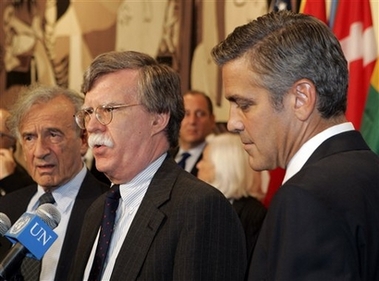HAVANA - Sudan's president again rejected the deployment of U.N. peacekeeping
troops in the war-torn Darfur region during a meeting with U.N.
Secretary-General Kofi Annan on Saturday. But one of the country's two vice
presidents said he would accept international intervention.

Nobel Peace Prize
winner Elie Wiesel, left, and actor George Clooney, right, look on as U.S.
ambassador John Bolton speaks during a news conference after addressing
members of the Security Council at the United Nations in New York Thursday
Sept. 14, 2006. The struggle over human rights in Sudan's Darfur region is
coming to New York, with speeches Thursday from Wiesel and Clooney and a
weekend demonstration at Central Park.[AP] |
Annan urged the government of Sudan in an editorial distributed Saturday to
accept the U.N. Security Council's decision to replace the largely ineffective
African Union peacekeeping force in Darfur with better-equipped U.N. troops.
"There can be no military solution to the crisis in Darfur," Annan wrote.
"All parties should have understood by now, after so much death and destruction,
that only a political agreement in which all stakeholders are fully engaged can
bring real peace to the region."
Sudanese President Omar al-Bashir rejected his appeal.
"Justice is and remains our objective but through diplomatic, political and
other means," he said, according to the English translation of his speech in
Arabic. "That's why we reject this position." Al-Bashir made the remarks at a
news conference in Cuba, where he and Annan were attending the Nonaligned
Movement summit.
At least 200,000 people have been killed in Darfur and more than 2 million
have fled their homes since 2003 when ethnic African tribes revolted against the
Arab-led government. The government is accused of unleashing brutal Arab
militiamen known as janjaweed in the remote western province.
First Vice President Salva Kiir Mayardit welcomed U.N. intervention. He heads
the Sudan People's Liberation Movement ¡ª a former southern rebel group that made
peace with Khartoum in January 2005.
"The aggravation of the humanitarian and security situation in Darfur
necessitates intervention of international forces to protect civilians from the
atrocities of the janjaweed militias so long as the government is not capable of
protecting them," Kiir was quoted as saying in remarks published Saturday by the
independent Al-Sudani daily.
The Darfur Peace Agreement, signed in May, calls for a cease-fire,
disarmament of militias and a protection force for civilians ¡ª but does not
specify the composition of such a force.
Last month, the Security Council passed a resolution demanding a
better-funded, larger and more well-equipped U.N. mission take over Darfur
peacekeeping duties from the African Union, whose mandate expires Sept. 30.
But the resolution was unlikely to take effect without the consent of the
Sudanese government, something nations including the United States have worked ¡ª
without success ¡ª to acquire. Al-Bashir has said that a switch in command would
violate the country's sovereignty and has warned that his army would fight any
U.N. forces sent to Darfur.
On Friday, President Bush said it could be time to send international
peacekeepers into Darfur over the objections of the government in Khartoum.
"What you'll hear is, 'Well the government of Sudan must invite the United
Nations in for us to act,'" Bush said. "Well, there are other alternatives, like
passing a U.N. resolution saying we're coming in with a U.N. force in order to
save lives."